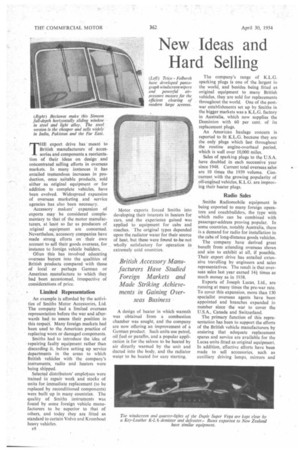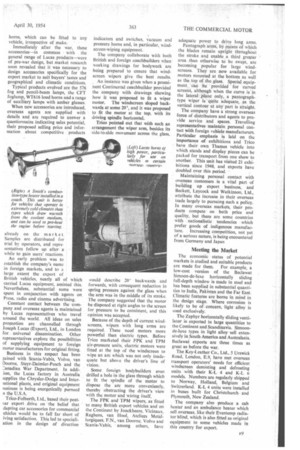New Ideas and Hard Selling
Page 102

Page 103

If you've noticed an error in this article please click here to report it so we can fix it.
THE export drive has meant to British manufacturers of accessories and components a reorientation of their ideas on design and concentrated selling efforts in overseas markets. In many instances it has entailed tremendous increases in production, once suitable products, sold either as original equipment or for addition to complete vehicles, have been evolved. Widespread expansion of overseas marketing and service agencies has also been necessary.
Accessory makers' expansion of exports may be considered complementary to that of the motor manufacturers, at least so far as producers of Driginal equipment are concerned. Nevertheless, accessory companies have made strong efforts on their own account to sell their goods overseas, for instance to foreign vehicle builders.
Often this has involved educating overseas buyers into the qualities of British products compared with those of local or perhaps German or American manufacture to which they had been accustomed, irrespective of considerations of price.
Limited Representation
An example is afforded by the activities of Smiths Motor Accessories, Ltd. The company had a limited overseas representation before the war and afterwards had to assess their position in this respect. Many foreign markets had been used to the American practice of replacing worn or damaged components.
Smiths had to introduce the idea of repairing faulty equipment rather than discarding it, before setting up service departments in the areas to which British vehicles with the company's instruments, radio and heaters were being shipped.
Selected distributors' employees were trained in repair work and stocks of units for immediate replacement (to be replaced by reconditioned components) were built up in many countries. The quality of Smiths instruments was found by some foreign vehicle manufacturers to be superior to that of others, and today they are fitted as standard to certain Volvo and Kromhout heavy vehicles.
FR Motor exports forced Smiths into developing their interests in heaters for cars, and the experience gained was applied to equipment for cabs and coaches. The original types depended upon the radiator water for their source of heat, but these were found to be not wholly satisfactory for operation in extremely cold countries.
A design of heater in which warmth was obtained from a combustion chamber was sought, and the company are now offering an improvement of a German product. Such units use petrol, oil fuel or paraffin, and a popular application is for the saloon to be heated by air directly warmed by the unit and ducted into the body, and the radiator water to be heated for easy starting. The company's range of K.L.G. sparking plugs is one of the largest in the world, and besides being fitted as original equipment to many British vehicles, they are sold for replacements throughout the world. One of the postwar establishments set up by Smiths in the bigger markets was a K.L.G. factory in Australia, which now supplies the Dominion with 60 per cent, of its replacement plugs.
An American haulage concern is reported to fit K.L.G. because they are the only plugs which last throughout the routine engine-overhaul period, which is well over 10,000 miles.
Sales of sparking plugs to the U.S.A. have doubled in each successive year since 1948. Current total overseas sales are 10 times the 1939 volume. Concurrent with the growing popularity of oil-engined vehicles, K.L.G. are improving their heater plugs.
Radio Sales
Smiths Radiomobile equipment is being exported to many foreign operators and coachbuilders, the type with which radio can be combined with passenger-address proving popular. In some countries, notably Australia, there is a demand for radio for installation in the cabs of long-distance goods vehicles.
The company have derived great benefit from attending overseas shows and aim to exhibit at all, if possible. Their export drive has entailed extensive travelling by engineers and sales representatives. The result is that overseas sales last year earned 14+ times as much money as in 1938.
Exports of Joseph Lucas, Ltd., are running at many times the pre-war rate. To cover this expansion, more than 130 specialist overseas agents have been appointed and branches expanded in number since the war to cover the U.S.A., Canada and Switzerland.
The primary function of this representation has been to support the efforts of the British vehicle manufacturers by ensuring that adequate replacement spares and service are available for the Lucas units fitted as original equipment. In addition, effective efforts have been made to sell accessories, such as auxiliary driving lamps. mirrors and horns, which can be fitted to any vehicle, irrespective of make.
Immediately after the war, these accessories—in common with the general range of Lucas products—were of pre-war design, but market research soon revealed that it was necessary to design accessories specifically for the export market to suit buyers' tastes and geographical and climatic conditions.
Typical products evolved are the 576 fog and pencil-beam lamps, the CFT foglamp, WT616 loud horns and a range of auxiliary lamps with amber glasses.
When new accessories are introduced, overseas agents are supplied with details and are required to answer a questionnaire indicating sales potential, their proposed selling price and information about competitive products
already on the mar k e t. Samples are distributed for trial by operators, and representatives follow up after a while to gain users' reactions An early problem was to establish the company's name in foreign markets, and to a large extent the export of British vehicles, nearly all of which carried Lucas equipment, assisted this. Nevertheless, substantial sums were spent in conjunction with agents on Press, radio and cinema advertising. Constant contact between the company and overseas agents is maintained by Lucas representatives who travel around the world. All ideas on sales promotion are channelled through Joseph Lucas (Export), Ltd., in London for universal dissemination. Other representatives explore the possibilities of supplying equipment to foreign motor manufacturers for original fitting. Business in this respect has been gained with Scania-Vabis, Volvo, van Ctoorne, Steyr-Daimler-Pusch and the L'anadian War Department. In addiion, the Lucas factory in Australia lupplies the Chrysler-Dodge and Interiational plants, and original equipment msiness is being energetically pursued n the U.S.A.
Trico-Fo/berth, Ltd., based their posttar export drive on the belief that dapting car accessories for commercial chides would be to fall far short of iving satisfaction. This led to specialiation in the design of direction indicators and switches, vacuum and pressure horns and, in particular, windscreen-wiping equipment.
The company collaborate with both British and foreign coachbuilders when working drawings for bodywork are being prepared to ensure that windscreen wipers give the best results.
An instance was given when a prominent Continental coachbuilder provided the company with drawings showing how it was proposed to fit a wiper motor. The windscreen sloped backwards at some 20°, and it was proposed to fit the motor at the top, with its driving spindle horizontal.
Trico pointed out that with such an arrangement the wiper arm, besides its side-to-side movement across the glass,
would describe 20" backwards and forwards, with consequent reduction in spring pressure against the glass when the arm was in the middle of its stroke. The company suggested that the motor be disposed at right angles to the screen for pressure to be consistent, and this opinion was accepted.
Because of the depth of current windscreens, wipers with long arms are required. These need motors more powerful than electric types. Before Trico marketed their FPK and TPM air-pressure units, electric motors were fitted at the top of the windscreen to wipe an arc which was not only inadequate but above the driver's line of vision.
Some foreign bodybuilders even drilled a hole in the glass through which to fit the spindle of the motor to dispose the arc more conveniently, thereby obstructing the driver's view with the motor and wiring itself,
The FPK and TPM wipers, as -fitted to many British export vehicles and on the Continent by Jonckheere, Vicinaux, Raghens, van Ilool, Ateliers Metallurgiques. F.N., van Doorne. Volvo and Scania-Vabis, among others, have
adequate power to drive long arms.
Pantograph -arms, by means of which the blades remain upright throughout the stroke and enable a third greater area than otherwise to be swept, are becoming popular for large windscreens. They are now available for motors mounted at the bottom as well as the top of the glass. Special, equipment can be provided for curved screens, although when the curve is in the lateral plane only, a pantographtype wiper is quite adequate, as the vertical contour at any part is straight.
The company have a strong overseas force of distributors and agents to provide service and spares. Travelling representatives maintain personal contact with foreign vehicle manufacturers. Particular emphasis is laid on the importance of exhibitions and Trico have their own Thames vehicle into which stands and display pieces can be packed for transport from one show to another. This unit has visited 21 exhibitions since 1948, and exports have doubled over this period.
Maintaining personal contact with overseas customers is a vital part of building up export business, and Beckett, Laycock and Watkinson, Ltd., attribute the increa:se in their overseas trade largely to pursuing such a policy. In many overseas markets, their products compete on both price and quality, but there are some countries with nationalistic tendencies which prefer goods of indigenous manufacture. Increasing competition, not yet of a serious nature, is being encountered from Germany and Japan
Meeting the Market
The economic status of potential markets is studied and suitable products are made for them. For example, a low-cost version of the Beclawat Simoon-de-luxe horizontally sliding full-depth window is made in steel and has been supplied in substantial quantities to India, Pakistan and the Far East. Climatic features are borne in mind in the design stage. Where corrosion is likely to be of concern, light alloy is used exclusively.
The Zephyr horizontally sliding ventilator is exported in large quantities to the Continent and Scandinavia. Simoonde-luxe types in light alloy sell extensively in South America and Australasia. Beclawat exports are three times as great as before the war.
The Key-Leather Co., Ltd., 5 Urswick Road, London, E.9, have met overseas transport operators' needs for efficient windscreen demisting and defrosting units with their K-L 4 and K-L 6 models. Numbers are regularly shipped to Norway, Holland, Belgium and Switzerland. K-L 4 units were installed in buses built for Christchurch and Plymouth, New Zealand.
The company also -produce a cab heater and an ambulance heater which sell overseas, like their Eventemp radiator blind, which is also fitted as original equipment to some vehicles made in this country for export.




















































































































































































































































